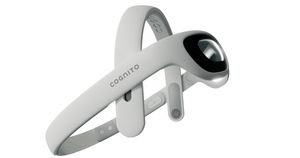Originally published by MobiHealthNews on March 23, 2023
Cognito Therapeutics, a startup using visual and auditory stimulation to treat neurodegenerative disorders, scored $73 million in a Series B funding round led by FoundersX Ventures, bringing its total raise to $93 million.
All existing investors participated in the round alongside new investors Starbloom Capital, Alzheimer's Drug Discovery Foundation, WS Investment Company and IAG Capital.
In addition, Dr. Rick Kuntz, former senior vice president and chief medical and scientific officer at Medtronic, and Helen Liang, founder and managing partner at FoundersX, will join the company's board of directors.
WHAT IT DOES
The Massachusetts-based company's investigational medical device uses noninvasive neuromodulation to treat people with neurodegenerative diseases like Alzheimer's. The clinical-stage device uses sensory stimulation to evoke gamma oscillations, which are believed to play a part in memory operations.
The clinical-stage neurotechnology company will use the funds to advance the study of its neuromodulation device.
"This funding will accelerate development of Cognito's home-based wearable device, which has the potential to be a novel, safe, disease-modifying therapeutic approach to treat neurodegenerative diseases, starting with Alzheimer's," Brent Vaughan, CEO of Cognito Therapeutics, said in a statement.
MARKET SNAPSHOT
In 2021, Cognito received FDA Breakthrough Device Designation for its neurostimulation device. Three months later, the company revealed its Phase 2 trial results that suggested its therapy slowed declines in memory and cognition in mild-to-moderate Alzheimer's disease patients.
Last year, the company announced a strategic partnership with Aetion, a startup focused on real-world evidence in healthcare, to develop a predictive model to identify patients with mild but rapidly progressing cognitive impairment and Alzheimer's disease.
Soon after, Cognito raised $50 million in funding and announced data that its proprietary gamma sensory stimulation reduced the brain's white matter atrophy in patients with Alzheimer's Disease.

